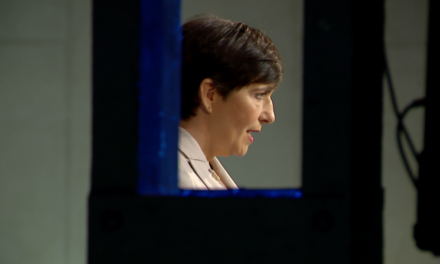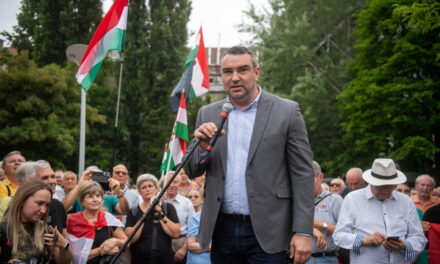It should be confused somewhere, let's say to the place that starts with p. Then he could sit there on the throne of self-plagiarism and play video games until the end of time.
The Rácz gets up in the morning, looks in the mirror, is frightened and sad because he is the Rácz, and it will remain so until the end of time.
And it goes like this every morning. In other words: self-plagiarism.
Rácz is busy all day long, and he is as useless as everything he is and like him.
And it goes like this every day. In other words: self-plagiarism.
Rácz is an expert. Because he is an "expert". Living, walking on two legs and indisputable proof of István Csurka's unassailable truth: "Expertise is an old Bolshevik trick."
Rácz is an expert. Because he is a "Russia expert". You can tell this from the fact that if you see a video game with a tank battle, you think you are seeing a real battle of the Russian-Ukrainian war, and you get it. The next time you fight with big pallos in another video game, you will also know it as one of the important moments of the Russian-Ukrainian war.
Rácz is stupid, and stupid every day - this is the basic self-plagiarism of his life, from which he also has no escape.
And because this is the situation, and because Rácz is also infinitely unnecessary, he bet his life on discovering self-plagiarism.
Who is watering geraniums, who is raising children, who is just reading, Rácz investigates self-plagiarism.
Anyway, self-plagiarism is a good little word. It's just like Rácz: stupid and unnecessary. Of course, now you have to act as if this is serious, because 444.hu and 24.hu and the others (the same as Rácz, stupid and unnecessary) devote twenty to thirty articles a day to the topic.
This morning I woke up to this: "University professor András Rácz revealed that Balázs Orbán's doctoral dissertation contains 9 pages of text taken without reference. Orbán copied parts from an article written jointly with Árpási Botond, thus self-plagiarism." Jucika Windisch drew my attention to this on 444.hu.
And yesterday I dozed off on this: "András Rácz: 9 pages of borrowed text are included without reference in Balázs Orbán's dissertation. In the final version of Balázs Orbán's dissertation, according to the plagiarism search engine, there are at least nine pages of literal or paraphrased quotations, without references, wrote on his Facebook page. On Thursday morning, Rácz reviewed Balázs Orbán's dissertation at the Secretariat of the Doctoral School of the ELTE Faculty of Law.
They won't believe it anyway, but none other than Jucika Windisch drew my attention to this. Thursday, November 28, at 3:04 p.m. Today, Friday, November 29, at 07:30.
We are excitedly waiting for November 30, Saturday, to see what novelty Windisch Jucika will come up with...
So, just be careful, because "profession" and "expertise" are very serious.
Forgács Pista already wrote it, it's worth taking it to heart:
The very scientific man says that it is self-plagiarism. Laugh softly because you'll look like a pro if you do it out loud. Incredible. Self-plagiarism. Lol.
Well, I say!
And while we wait for Jucika Windisch's new extensive report, let's examine in our boredom what we can read and know about this "self-plagiarism".
Balázs Orbán was not alone - the ELTE scandal became international
Let's start with the person concerned, that is, with one of ELTE's definitions:
"Plagiarism investigation
The uploaded theses are examined using the S ztaki kopi plagiarism search engine, which searches for textual matches with the content of the documents in its database and the Hungarian Wikipedia. Based on experience, a few percentage matches in the result generated by KOPI occur even without real plagiarism, but starting with a match of about 10%, we carefully examine individual cases. (…)
Copying a longer complete sentence or part of a text without quotation marks is considered plagiarism. An exception is »self-plagiarism«: verbatim parts can be taken from one's own other work, in this case it is also necessary to cite the source only for one's own previous research results (in order to clearly distinguish the old and new results).
Since the boundaries of plagiarism (even good taste) cannot be precisely defined, we investigate each suspected case individually, with the involvement of the student concerned and his or her supervisor. We sanction and make public only the cases deemed clear, by the collective decision of the management of the BTDK. We hope that this will never be necessary.” (Read here .)
Then Elemér Hankiss also "fell into sin", we can read about this:
"Elemér Hankiss: The unfinished man - second edition - Helikon Kiadó , 2015 - 344 pages, hardcover - ISBN 9789632274966. The death of Elemér Hankiss in January of this year created a void that we don't really want to comprehend. However, if ever, the open and fresh thinking that he was able to cultivate with such unique elegance would be needed now. Now we need that thinker who is not impressed and not shackled by the coordinate system of thinking in schemes. Fortunately, The Unfinished Man appeared (again). So it's at least a bit like reflecting on our busy everyday life! Elemér Hankiss is accused of plagiarism by no less a person than Elemér Hankiss. And with self-plagiarism! In the form of a confession, in the 3rd footnote of the book's introduction, and so that we can be completely calm - the framework should also be there! - also provides a list of plagiarized books in the appendix. A few years ago, we would have said something like this was a frivolous game, but now it seems more like - in the most positive way - impudence and frivolity."
It can be read here . (The title of the article is: Elemér Hankiss and acceptable plagiarism)
And finally, let's quote a stricter one:
"Citations are an important aspect in the case of scientific publications, however, it does not matter whether the high number of citations shows the professional influence of the researcher or is only the result of an exceptionally large amount of self-citations.
In science, it is common for the authors of research articles to reuse a previously formulated sentence or text fragment, and to include it in their next article if it is related to the topic. This is the practice of self-citation. In cases where the author has shed light on a fact or conducted research on which new discoveries are based, the previous work must of course be cited. This must be done in all cases, even if the referenced article is our own, even if it is the work of someone else. Correctly executed self-citation confirms the originality of the publication, and also helps the reader to see behind the work and understand how the research developed until it reached its current state.
The multiple reuse of verbatim details can be called »self-plagiarism« in Hungarian. Do you feel like a contradiction? The observation may be justified, because how could you steal your own ideas from yourself?
However, it is important to be aware that the citation is not only for giving credit to an idea, it also serves another purpose. With the right reference, you can ensure that the reader can follow the development of the research, the progress of the discoveries, and also support the originality of the communication.
How to avoid it?
There isn't really a rule as to when it's acceptable to reuse your own passages verbatim. In all cases, the customary system of the scientific field, the genre of the publication being prepared, the expectations of editors, publishers and readers, as well as copyrights, must be taken into account. (Read here .)
Well, that's about it. Also, there is one more thing. Because the stupid and unnecessary Rácz is very strict, but not with everyone, not with himself, for example, when it comes to self-plagiarism.
I show you:
"András Rácz can't stop: now he is attacking Balázs Orbán with what he himself did in the same way:
András Rácz, the not-so-famous Russia expert, is still busy with Balázs Orbán's doctoral dissertation, and moreover, he is attacking him with something that he apparently did himself. (…) All of this is an interesting accusation if only because of András Rácz's doctoral dissertation, since the two examples below show that András Rácz's doctoral dissertation contains passages that he also used in another study, presumably made at a similar time. Moreover, in none of the cases is there any indication that he refers to himself, to the earlier source of the texts. On page 38 of András Rácz's doctoral dissertation in 2008, the following text is precisely stated: »The text, based on the term 'might' used in the English original, means that the CFSP will either lead to common protection over time or not. The treaty did not, could not, go beyond this ambiguous wording, as the member states did not intend to renounce defense independence, which is one of the key elements of national sovereignty.''
In parallel with this, on page 45 of András Rácz's 2008 study, The First Decade of the Development of the ESDP, published in the Security Policy Review, the following text is included: "The text, based on the term 'might' used in the English original, means that the CFSP will leads to joint protection or not. The treaty did not, could not, go beyond this ambiguous wording, as the member states did not intend to renounce defense independence, which is one of the key elements of national sovereignty."
Also, we can easily find a similar, clear example on the same page, when we come to the following passage on page 38 of András Rácz's 2008 doctoral dissertation: "The Maastricht Treaty therefore did not provide for the establishment of common defense. One of the important elements of the intergovernmental conferences held in 1996-1997 to reform the treaty was that they emphasized the need for concrete protection-type measures within the CFSP."
On page 45 of the 2008 study entitled The First Decade of the Development of the ESDP, published in the Security Policy Review, we can also find this:
"Therefore, the Maastricht Treaty did not provide for the establishment of common defense. One of the important elements of the intergovernmental conferences held in 1996-1997 to reform the treaty was that they emphasized the need for concrete protection-type measures within the CFSP."
The question arises: why is Rácz not so strict with himself? Maybe because he is driven by personal revenge against Balázs Orbán. The memorable expert title of András Rácz suffered a serious loss in May 2022, shortly after the outbreak of the Russian-Ukrainian war.
It just so happened that in ATV's Heti napló show, together with host András Sváby, they watched and analyzed a tank battle scene, which later turned out to be from a video game.
Since then, many of Rácz's prognoses have gone completely wrong, he often predicted, for example, Russia's coming to its knees or the effectiveness of sanctions.
Not much later, in July 2022, the news arrived: András Rácz's contract was not extended by the National University of Public Service. In his post reporting on this, the expert stated, among other things, that he did not know the exact reason, he had only heard rumours, but due to their nature, these are difficult to verify. on the other hand, they are basically irrelevant in terms of the end result.
According to our information, that certain rumor could mean that it was Balázs Orbán who did not want the extension. His current actions regarding the political director's doctorate can hardly be separated from this circumstance, it can even be interpreted as a kind of revenge. (Read here .)
This Rácz is very mischievous, isn't he?
It should be confused somewhere, let's say to the place that starts with p. Then he could sit there on the throne of self-plagiarism and play video games until the end of time.
Featured image: Tamás Kaszás / Index













